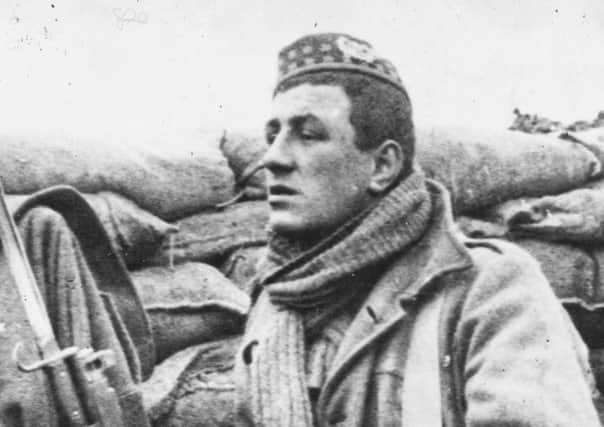Book review: Beneath Troubles Skies: Poems Of Scotland At War


Beneath Troubled Skies: Poems Of Scotland At War, edited by Lizzie MacGregor | Polygon, £12.99
In light of recent events, it is instructive to re-read Jon Silkin’s introduction to The Penguin Book of First World War Poetry (1996 edition), in which he divides the poetic output of the Great War into four distinct phases, or “stages of consciousness”. The first, he describes as “Not so much a stage in consciousness as a passive reflection of, or conduit for, the prevailing patriot ideas” as exemplified by the naive, unquestioning patriotism of Rupert Brooke. He then goes on to identify a second phase, that of the “angry prophet”, exemplified by Siegfried Sassoon; a third, that of compassion, typified by Wilfred Owen; and a fourth, in which anger and compassion are “merged… into an active desire for change”, as in the poems of Isaac Rosenberg.
Advertisement
Hide AdDo our attitudes to war always follow this pattern? The peace marches of recent weeks, months and years suggest that many people now seem able to leap straight to phase four, even as some media outlets apparently remain incapable of moving beyond phase one. Progress of a sort, perhaps.
Silkin’s four phases also provide a useful framework within which to read Beneath Troubled Skies, a new compendium of First World War poetry written by Scots both at the Front and at home. In the first of four short but effective commentaries, each one introducing a different year of the conflict, historian Yvonne McEwan notes that, on 10 August, 1914, The Scotsman published its first poem of the conflict, “War” by WH Ogilvie. Its opening couplet, “Play up pipers of Scotland, blare to the world that waits! / Tell them our youth and manhood stand massed by the Northern Gates!” could hardly be a more perfect example of Silkin’s phase one, and the same can be said for much of the poetry from 1914 here, notably Charles Murray’s “A Sough o’ War”, with its desire to show the world that “Auld Scotland counts for something still”.
That said, there are exceptions. Charles Hamilton Sorley’s 1914 poem “To Germany” looks forward to peace, when “we may view again / with new-won eyes each other’s truer form.” The white-hot rage of Sassoon has no real equivalent here, except perhaps in Donald MacDonald’s Gaelic poem “Òran a’ Phuinnsein” (The Song of Poison) in which, following a gas attack, he wishes for Germany to suffer “Fire raining from the sky on it / To melt it without mercy.”
There is much that is Owen-esque in terms of its compassion, if perhaps not its quality, and in his “Sonnets in Captivity”, WD Cocker comes closest to expressing a Rosenberg-like desire for “a nobler world”, one in which we “glory… in the impulse which controls our deeds.”